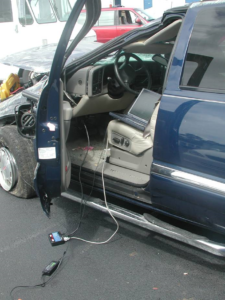A vehicle’s event data recorder (sometimes called EDRs) or a black box (similar to what planes have) generally capture rudimentary information just prior to an accident. The inflation of the airbag initiates the retention of up to 15 different pieces of information such as vehicle speed, seat belt use and brake application. Currently, black boxes in cars are promoted to be used in research that can aid automakers and government agencies in the design of safer vehicles.
The easiest way to find if your car has a black box, check out your owner’s manual. In 2012, the US Congress passed the MAP-21 which mandated that auto manufacturers would be required to install EDRs in all new vehicles beginning in 2015. In 2012, the National Highway Transportation Safety Administration estimated that 96 percent of all cars already had EDRs. In December 2015, the federal Driver Privacy Act of 2015 was enacted which placed limitations on data retrieval from EDRs and states that the information gathered belongs to owner or lessee of the vehicle. Check out your state’s law HERE on EDRs.
The National Motorists Association position on black boxes and other similar recording devices, is intended to permit the alleged research function while preventing the use of this equipment to the detriment of uninformed and unwilling vehicle owners and operators.
Vehicle owners should willingly agree to the installation with no coercion to accept the devices. Coercion would include discounting the base price. A car without a black box should cost the same as one with a black box. If a vehicle owner has a black box, he or she should be allowed to use the information gathered for his or her own purposes in any civil or criminal matter. Also, vehicle owners should be allowed to activate, de-activate, and read without any special or expensive equipment their own black box.
Black boxes should never be allowed to be used to transmit or broadcast data to any external wireless receiver. The installation and operation of a black box should be independent from the operation of all other vehicle systems and components so that if the black box is disabled and not collecting data, the systems and components can still operate normally.
Insurance companies should never be allowed to require as a condition of coverage access to the black box and law enforcement should be prohibited coerced use by subpoena, court order or discovery the information from a box.
Who owns the Data Anyway?
So far, experts and the law agree that the data generated by the black box is owned by the car’s owner. But you are a bit limited on what you can do with the box and its information.
Because the black box is integrated with the airbag system, removing the black box is unfortunately probably not an option.
If you are involved in an accident, erasing or destroying the recorder will indicate that presumption is against you.
Police are required to obtain a warrant in order to access the black box data after a crash. Police are generally not allowed to use it to replace accident scene reconstruction, only to support data found by other means.
Most insurance policies essentially give your insurance company the right to the data by way of a clause that states you agree to “cooperate” or “assist in settling a claim. We have also heard tales of insurance investigators who obtain a license to buy used cars so he or she can buy someone’s totaled car at auction just to retrieve the black box.
How could your Black Box be used Against You in the Future?
As cars become more connected to the Internet of Things through WiFi and 5G, the government, insurance companies and automakers could get together and require an entire new set of black box standards of use.
1) The speed of your vehicle could be sent directly to a state trooper who can then send you an automated ticket.
2) A law enforcement officer could use your black box to turn off and/or locate your vehicle if you are wanted for a crime.
3) A DMV clerk could plug into your data system and find all the violation charges from the past year that you would have to pay in order to renew your license and/or your plates.
4) A black box could be integrated with cashless toll transponders that would also be used as an assessment for renewing a license or plates.
5) If a Vehicle Miles Traveled tax were to take hold, a miles GPS monitor could also be integrated into your black box and downloaded to keep tabs on your miles driven.
6) If you have any other scenarios, please leave them in the comments below.
Laws stipulating that vehicle owners also own the data being collected by black boxes are necessary. The motorists and no other entity should have the right to release this information. Also, auto dealerships must be required to tell consumers that such a device is in their vehicle and they must be willing to help owners disable the black box in their new car.
Of course, the National Motorists Association will work diligently to make sure that these type of black box scenarios will never be utilized. Join us today in supporting this important advocacy work on behalf of the American motorist.







